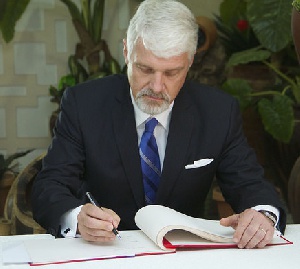Business News of Wednesday, 6 May 2015
Source: B&FT
EPA is misunderstood -- EU boss
The concerns raised about the implementation of the Economic Partnership for Africa (EPA) by various stakeholders is down to an information gap that needs to be addressed, William Hanna, Ambassador, Head of European Union delegation, has said.
“I still hear very often certain concerns and worries. I think we need to explain more clearly; we need to show that it is an opportunity. This is a new way of doing things.
“We have an example from the EU. I don’t think anybody in the EU think that today it would be better to go back to barriers. We want to bring the cost down and allow better competition and better quality for consumers.” Under the terms of the full EPA, the EU is seeking a reciprocal trade arrangement between it and the African, Caribbean and Pacific (ACP) countries to replace the non-reciprocal and preferential trade agreements it offered under the Cotonou Agreement.
The EU, under the full EPA agreement initialled by Ghana and some other West African Countries, will gain access to 75 percent of ECOWAS’ market over a 20-year phase-in period. The EU is bound to also give ECOWAS €6.4billion to manage the cost of adjusting to the EPA.
The agreement has been severely criticised by civil society organisations in the sub-region, who have argued that it is inimical to the survival and growth of manufacturing industries in the sub-region – which are already being put to the sword by cheap imports, mainly from Asia.
Fierce critics of the EPA, including the Economic Justice Network (EJN), Third World Network-Africa, the Trades Union Congress, the Ghana Chamber of Commerce and the Christian Council, argue that the without the EPA, 72 percent of Ghana’s exports to the EU will still benefit from duty-free, quota-free access while 28 percent -- mainly tuna, fruit and vegetables, and cocoa butter and paste -- will face duties.
They argue that rather than sign the full EPA, government could have used part of the import tariff revenue it would had saved from not signing the EPA to absorb taxes that would have been slapped on the 28% exports by the EU.
Mr. Hanna, speaking at a workshop on developing strategies and measures for the imminent implementation of the EPA in Accra, said that the APA offers an opportunity for local entrepreneurs. “Ghanaian companies should be able to benefit from that larger EU market. It will also allow Ghanaian businesses to move up the value chain and add value to their products and to diversify Ghana’s exports.
“Building the capacity of the Ministry of Trade on key reforms and the opportunities are part of the process of getting ready.
“It is ultimately to create jobs. If we look at the changing demographics, it is so important that Europe works with countries like Ghana to create opportunities here for young people, and not for young people to risk their lives in the hands of trafficker trying to cross the Mediterranean into Europe just because they think there is a better opportunity in the EU.”
Ekwow Spio-Garbrah, Trade and Industry Minister, in a statement read on his behalf said apart from gaining access to the big EU market, the partnership will allow the country to benefit from various machinery and inputs needed for improving productivity.











